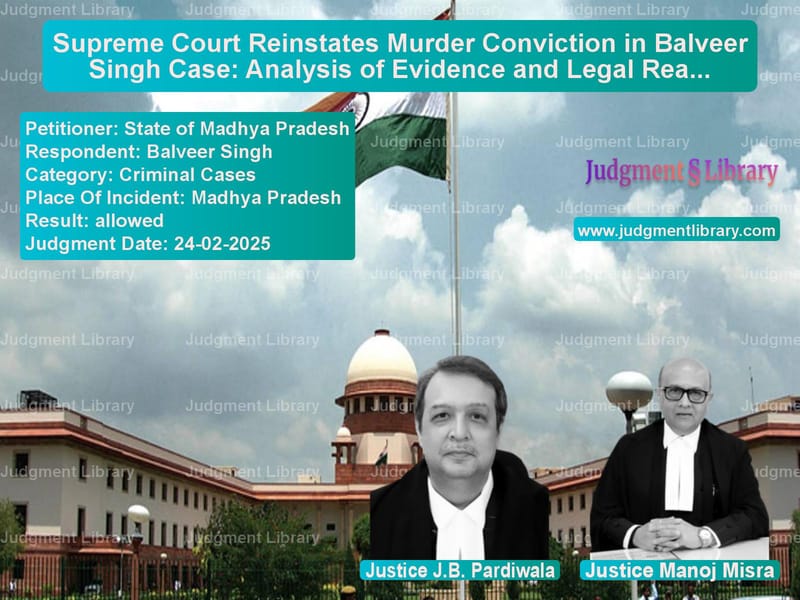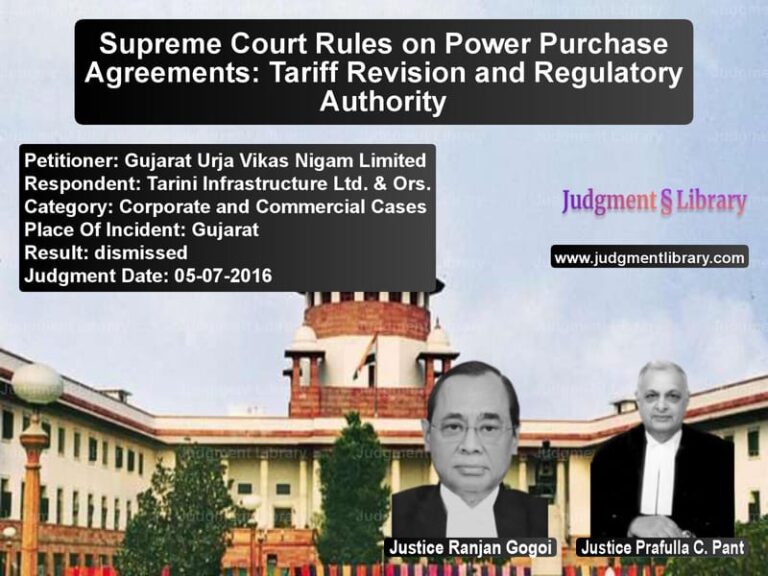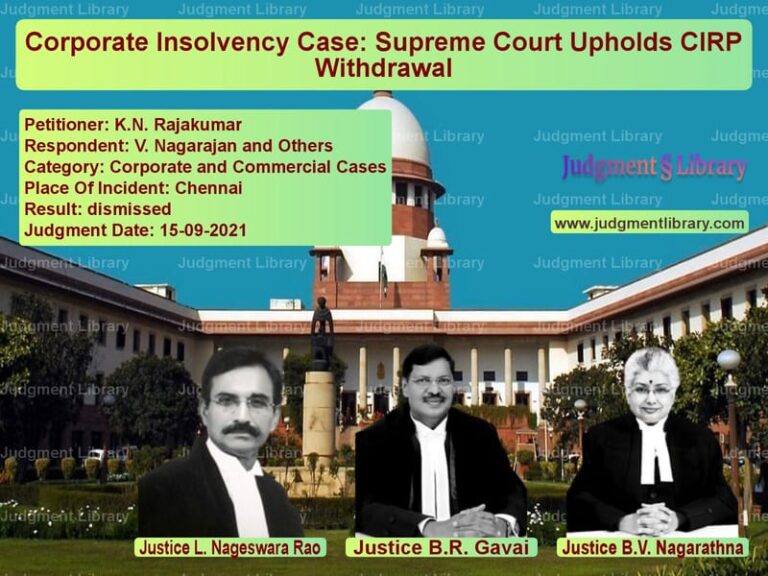Supreme Court Reinstates Murder Conviction in Balveer Singh Case: Analysis of Evidence and Legal Reasoning
The Supreme Court of India recently reinstated the conviction of Balveer Singh in the case of State of Madhya Pradesh v. Balveer Singh, overturning an acquittal granted by the Madhya Pradesh High Court. This judgment emphasizes the importance of circumstantial evidence, the burden of proof in cases of unnatural deaths within a household, and the necessity of a consistent and logical approach to evaluating witness testimony.
Background of the Case
The case originated from the alleged murder of the accused’s wife, Virendra Kumari, on the night of July 15, 2003. The prosecution contended that Balveer Singh killed his wife by choking her and later cremated her body in secrecy. The complainant, Bhoora Singh, along with his father, claimed to have heard screams from the accused’s house on the night of the incident. The next morning, they discovered that Virendra had died and had already been cremated, raising suspicions.
The prosecution relied on circumstantial evidence, primarily the testimony of PW6 (Rani), the deceased’s daughter, who claimed to have witnessed her father committing the crime. The trial court convicted Balveer Singh under Sections 302 (murder) and 201 (causing the disappearance of evidence) of the Indian Penal Code (IPC), but the High Court later acquitted him, citing insufficient evidence. The State of Madhya Pradesh appealed the decision before the Supreme Court.
Arguments of the Parties
Petitioner’s Arguments (State of Madhya Pradesh)
The State, challenging the acquittal, argued:
- The High Court erred in disregarding the consistent and credible testimony of PW6 (Rani), the deceased’s daughter.
- The accused failed to provide any explanation regarding the sudden death of his wife, raising a strong presumption against him.
- The body was cremated in the dead of night, without informing the deceased’s family, which clearly indicated an attempt to destroy evidence.
- The High Court placed undue emphasis on minor inconsistencies and procedural delays while ignoring the overarching circumstantial evidence.
Respondent’s Arguments (Balveer Singh)
The accused, defending the High Court’s acquittal, countered:
- The delay in recording PW6’s statement indicated that she had been tutored and her testimony could not be relied upon.
- There were no independent witnesses to corroborate the claim that the accused was present at the scene of the crime.
- The possibility of natural death was not ruled out by the prosecution.
- The High Court was correct in finding that the trial court’s reliance on circumstantial evidence was insufficient to establish guilt beyond a reasonable doubt.
Supreme Court’s Analysis
The Supreme Court carefully examined the evidence, particularly the testimony of PW6 (Rani), and the circumstances surrounding the cremation. The Court emphasized the importance of circumstantial evidence when direct evidence is not available and applied key principles of criminal jurisprudence.
Key Observations by the Supreme Court:
- “The prosecution’s case is based on a strong chain of circumstantial evidence that the High Court has erroneously disregarded.”
- “The testimony of PW6, the daughter of the deceased, is natural, consistent, and credible. She had no reason to falsely implicate her father.”
- “The fact that the deceased’s body was cremated in secrecy without informing her family raises a strong presumption that the accused had something to hide.”
- “In cases where a crime is committed inside a house, Section 106 of the Indian Evidence Act places the burden on the accused to explain the circumstances of the death.”
- “It is well established that delay in recording a child witness’s statement cannot be a sole ground for discrediting their testimony, especially when there is no material contradiction.”
Legal Precedents Cited
The Supreme Court relied on several landmark rulings to reinforce its judgment:
- Trimukh Maroti Kirkan v. State of Maharashtra (2006): Held that when an unnatural death occurs inside a house, the burden is on the accused to explain.
- Bhagwan Das v. State (NCT of Delhi) (2011): Established that motive, though relevant, is not always necessary to convict when other evidence forms a complete chain.
- Rajesh Govind Jagesha v. State of Maharashtra (1999): Affirmed that testimony of child witnesses must be scrutinized but not outrightly dismissed due to delay.
Final Judgment
Considering the overwhelming circumstantial evidence, the Supreme Court ruled:
- The High Court’s acquittal was erroneous and liable to be set aside.
- The trial court’s conviction was reinstated.
- The accused was sentenced to life imprisonment under Section 302 IPC.
- The sentence under Section 201 IPC (destruction of evidence) was also restored.
Impact of the Judgment
This ruling has significant implications for criminal law:
- Affirms the validity of circumstantial evidence: When direct evidence is unavailable, a strong chain of circumstances can form the basis of a conviction.
- Clarifies the burden of proof in domestic crimes: In cases of unnatural deaths inside a house, the accused must explain the circumstances.
- Sets a precedent for evaluating child witness testimony: Delay in recording statements does not automatically render testimony unreliable.
- Strengthens deterrence against domestic violence: The ruling underscores the judiciary’s commitment to ensuring justice in domestic murder cases.
Conclusion
The Supreme Court’s judgment in State of Madhya Pradesh v. Balveer Singh reinforces fundamental principles of criminal justice, ensuring that procedural lapses do not allow guilty individuals to escape accountability. By reinstating the trial court’s conviction, the ruling serves as a crucial precedent in cases involving domestic violence, circumstantial evidence, and the burden of proof in unnatural deaths within a household.
Petitioner Name: State of Madhya Pradesh.Respondent Name: Balveer Singh.Judgment By: Justice J.B. Pardiwala, Justice Manoj Misra.Place Of Incident: Madhya Pradesh.Judgment Date: 24-02-2025.
Don’t miss out on the full details! Download the complete judgment in PDF format below and gain valuable insights instantly!
Download Judgment: state-of-madhya-prad-vs-balveer-singh-supreme-court-of-india-judgment-dated-24-02-2025.pdf
Directly Download Judgment: Directly download this Judgment
See all petitions in Murder Cases
See all petitions in Bail and Anticipatory Bail
See all petitions in Judgment by J.B. Pardiwala
See all petitions in Judgment by Manoj Misra
See all petitions in allowed
See all petitions in supreme court of India judgments February 2025
See all petitions in 2025 judgments
See all posts in Criminal Cases Category
See all allowed petitions in Criminal Cases Category
See all Dismissed petitions in Criminal Cases Category
See all partially allowed petitions in Criminal Cases Category







